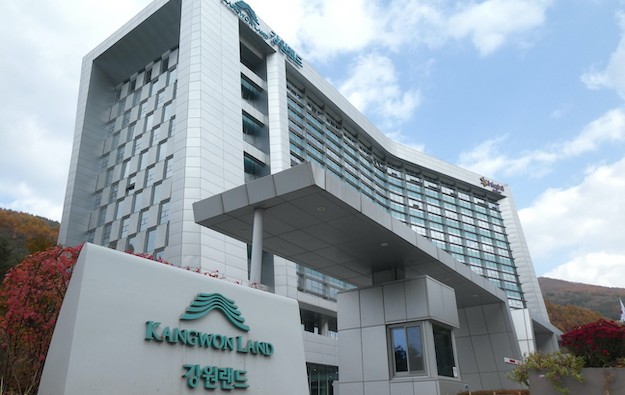Kangwon drove 2021 S.Korea casino revenue growth: govt
May 18, 2022 Newsdesk Latest News, Rest of Asia, Top of the deck

Gambling revenue in South Korea’s casino market rose by 13.3 percent year-on-year in 2021, to KRW1.18 trillion (US$931.0 million), from KRW1.04 trillion in 2020, according to data from the Ministry of Culture, Sports and Tourism, released on its website on Tuesday.
But the improvement was due to Kangwon Land (pictured), the only resort allowed to serve domestic customers.
The data indicated Kangwon Land Inc, operator of the Kangwon Land resort, saw its gambling revenue up to 74.7 percent year-on-year in 2021, to KRW775.0 billion, from KRW443.5 billion.
The ministry’s methodology used for measuring such revenue, differs from the the industry operators, due to accounting for bad debt, complimentary allowances, and commissions.
The 2021 casino revenue for the country’s 16 foreigner-only casinos actually had a 32.3 percent decline, to KRW405.0 billion, from KRW597.8 billion in 2020, according to the ministry’s data.
The aggregate number of visits to the country’s casino venues saw an 11.8-percent decline year-on-year, to 1,552,711, from 1,760,232 in 2020.
Paradise Co Ltd, one operator of foreigner-only casinos, reported gambling sales down 25.5 percent year-on-year in 2021, to KRW249.9 billion, from KRW335.5 billion.
Grand Korea Leisure Co Ltd, another entity with foreigner-only casinos, experienced its gambling sales fall 51.8 percent year-on-year in calendar-year 2021, to KRW89.6 billion, from KRW186.0 billion.
The total number of employees in casino businesses fell 5.9 percent, down by 417 employees year-on-year; to 6,688 employees in 2021. The industry’s employee tally in 2020 had been 7,105.
The number of employees at Paradise Co Ltd was down 164 by year-end 2021, to 1,817 employees, compared to 1,981 in 2020.
For Landing Casino, at Jeju Shinhwa World on Jeju, operated by Hong Kong-listed Landing International Development Ltd, the workforce was down to 256 by year-end, from 451 employees in 2020, a year-on-year change of 195.
Coinciding with those year-on-year changes, during 2021 both those firms had conducted what they respectively termed “voluntary retirement” exercises among casino staff, according to South Korean news reports and Landing International announcements.
Due to the Covid-19 pandemic, all South Korean casinos had in 2021 faced capacity limitations. Some had also faced periods of temporary disruption.
The ministry’s data also said KRW112.4 billion was assessed as payable by the industry for calendar-year 2021, for the country’s “Tourism Promotion and Development Fund”. That was a rise of 15.1 percent year-on-year, from 2020’s KRW97.7 billion.
A mandatory contribution to the fund is levied on the whole casino industry, but the actual payment date of the 2021 amount “would be…next year”, i.e., 2023, according to the ministry’s data table.
The ministry said such contribution was calculated as a percentage of the industry’s total gambling sales revenue. For any individual casino business with annual sales revenue of under KRW1.0 billion, the levy was set at 1 percent of such revenue.
Any casino business with sales revenue of KRW1.0 billion up to KRW10.0 billion, were required to pay 5 percent.
If any casino business had sales revenue over KRW10.0 billion, it was mandated to pay 10 percent of that to the fund.
Related articles
-
 Kangwon Land 2Q net profit up 64pct...
Kangwon Land 2Q net profit up 64pct...Jul 19, 2024
-
 S.Korea’s Paradise Co June gaming...
S.Korea’s Paradise Co June gaming...Jul 03, 2024
More news
-
 Donaco EBITDA up y-o-y to above US$4mln...
Donaco EBITDA up y-o-y to above US$4mln...Jul 26, 2024
-
 HK listed Palasino upgrades Czech...
HK listed Palasino upgrades Czech...Jul 26, 2024
Latest News
Jul 26, 2024
Border-casino operator Donaco International Ltd has achieved a 164.17-percent year-on-year increase in its latest quarterly group earnings before interest, taxation, depreciation and amortisation...Sign up to our FREE Newsletter
 (Click here for more)
(Click here for more)
Pick of the Day
”We’ve got more traction outside of Macau at the moment. But Macau’s going be a bigger focus for us”
David Punter
Regional representative at Konami Australia
Most Popular
 Sheraton brand to exit Londoner Macao, to be Londoner Grand July 25, 2024
Sheraton brand to exit Londoner Macao, to be Londoner Grand July 25, 2024  Macau regulator probes unlicensed gaming agents July 24, 2024
Macau regulator probes unlicensed gaming agents July 24, 2024  Philippines gives 20k aliens in POGOs 60 days to leave July 25, 2024
Philippines gives 20k aliens in POGOs 60 days to leave July 25, 2024  Philippines-listed DigiPlus says not affected by POGO ban July 24, 2024
Philippines-listed DigiPlus says not affected by POGO ban July 24, 2024  Sands China 2Q EBITDA down q-o-q amid low hold, renovation July 25, 2024
Sands China 2Q EBITDA down q-o-q amid low hold, renovation July 25, 2024






